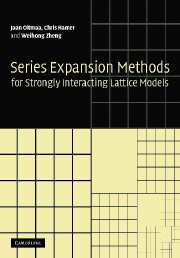Book contents
- Frontmatter
- Contents
- Preface
- 1 Introduction
- 2 High- and low-temperature expansions for the Ising model
- 3 Models with continuous symmetry and the free graph expansion
- 4 Quantum spin models at T = 0
- 5 Quantum antiferromagnets at T = 0
- 6 Correlators, dynamical structure factors and multi-particle excitations
- 7 Quantum spin models at finite temperature
- 8 Electronic models
- 9 Review of lattice gauge theory
- 10 Series expansions for lattice gauge models
- 11 Additional topics
- Appendix 1 Some graph theory ideas
- Appendix 2 The ‘pegs in holes’ algorithm
- Appendix 3 Free graph expansion technicalities
- Appendix 4 Matrix perturbation theory
- Appendix 5 Matrix block diagonalization
- Appendix 6 The moment–cumulant expansion
- Appendix 7 Integral equation approach to the two-particle Schrödinger equation
- Appendix 8 Correspondences between field theory and statistical mechanics
- Appendix 9 Computer programs
- Bibliography
- Index
4 - Quantum spin models at T = 0
Published online by Cambridge University Press: 06 January 2010
- Frontmatter
- Contents
- Preface
- 1 Introduction
- 2 High- and low-temperature expansions for the Ising model
- 3 Models with continuous symmetry and the free graph expansion
- 4 Quantum spin models at T = 0
- 5 Quantum antiferromagnets at T = 0
- 6 Correlators, dynamical structure factors and multi-particle excitations
- 7 Quantum spin models at finite temperature
- 8 Electronic models
- 9 Review of lattice gauge theory
- 10 Series expansions for lattice gauge models
- 11 Additional topics
- Appendix 1 Some graph theory ideas
- Appendix 2 The ‘pegs in holes’ algorithm
- Appendix 3 Free graph expansion technicalities
- Appendix 4 Matrix perturbation theory
- Appendix 5 Matrix block diagonalization
- Appendix 6 The moment–cumulant expansion
- Appendix 7 Integral equation approach to the two-particle Schrödinger equation
- Appendix 8 Correspondences between field theory and statistical mechanics
- Appendix 9 Computer programs
- Bibliography
- Index
Summary
Introduction
In the limit of zero temperature, the partition function is dominated by the ground state of the system, the free energy becomes equivalent to the ground state energy, and the central object of interest is the Hamiltonian of the system H(λ), dependent in general on one or more parameters λ. A ‘quantum’ Hamiltonian, as noted previously, is one which contains non-commuting operators. Here we concentrate on quantum spin Hamiltonians, of which the prime example is the Heisenberg model. Of particular interest is the possibility of a quantum phase transition, i.e. nonanalytic behaviour as a function of coupling λ. A quantum phase transition may exert a dominating influence on the system over a range of low temperatures above T = 0. Such phenomena have figured prominently in theoretical discussions of experiments on the cuprate superconductors, the heavy fermion materials, organic conductors, and related materials (e.g. Sachdev, 1999).
In some cases, a correspondence can be found between a quantum system at zero temperature in 1 time and (d – 1) space dimensions, and an equivalent classical system at finite temperature in d space dimensions, based on the Feynman path integral formalism – see Chapter 9 and Appendix 8 for further discussions. Under this mapping, the temperature kT in the classical system corresponds to a coupling λ in the equivalent quantum system. If a phase transition occurs, the same universal critical exponents are expected to apply in both cases.
- Type
- Chapter
- Information
- Publisher: Cambridge University PressPrint publication year: 2006



